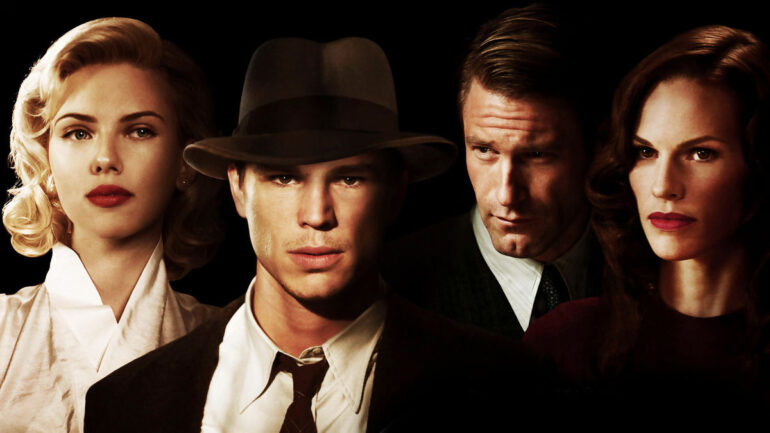Plot: Two cops in 1940s Los Angeles investigate the murder of a Hollywood starlet (Mia Kirshner), and one (Aaron Eckhart) puts his marriage in jeopardy by obsessing over the crime, while the other (Josh Hartnett) becomes involved with a woman (Hilary Swank) from a prominent family, who happens to have an unsavory tie to the victim.
Maybe I’ve got a soft spot for the underdog, or I like stuff other people don’t, but I thoroughly enjoy Brian DePalma’s 2006 noir thriller The Black Dahlia.
A box office bomb when released, this fictionalised account of the notorious murder of wannabe starlet Elizabeth Short focuses more on the relationship between three broken souls than the actual grisly crime. It’s one of the things 2006 critics lambasted the film for but I think the film’s flaws make it interesting.
Various A-listers like Mark Wahlberg and Kate Winslet were up for roles, but Josh Hartnett, Aaron Eckhart and Scarlett Johansson ended up being the leads.
Many felt the pic was miscast, but having read the novel, I feel Hartnett, and particularly Eckhart, are quite good and match their characters perfectly. Johannson as the love interest is a little off in places, seeming too young and inexperienced to be the damaged pretty girl Kay Lake.
Oscar dinner Hilary Swank fares worse as femme fatale Madeline Linscott. It’s hard to imagine anyone falling for her charms since she’s so flat and dull. The real stand out here is Mia Kirschner as the ill-fated Dahlia. Kirschner is heartbreaking in this small, but pivotal role, and the other characters’ decent into madness seems justified given her fractured innocence.
All tech credits are top notch — the film is handsomely shot and the production design is outstanding given most of 1940’s Los Angeles was recreated in 2005 Bulgaria. Mark Isham’s score, while evocative of Jerry Goldsmith, is well used and has a dark spirit.
A director like DePalma knows how to stage action sequences, and TBD has a doozy about 80 minutes in that’s well choreographed and edited. And is insanely gruesome. No one else but DePalma could stage such a sequence with that much tension and dread.
One gripe I have with the pic, and I’m sure this is due to the producers wanting a two hour movie, is that some characters are half introduced and then thrown out without explanation. And another central character is murdered and the body disposed of, but no one mentions them ever again or asks where they are. Highly dubious. Maybe if the film had gone another ten minutes longer this could have been cleared up.
As the plot wraps up and things become clear, the motive for the Black Dahlia murder seems extremely creepy and disturbing. This sequence of the film is hard to watch and perhaps the pic’s bleak tone kept audiences away upon its release. I for one felt they got this part of the film right.
The Black Dahlia is a guilty pleasure — an expensive, confusingly edited, neo-noir period thriller with three great performances by Eckhart, Hartnett and Kirschner. It’s easy to see why it failed upon release, but the film begs for reappraisal now. Would it be classified as forgotten masterpiece? Doubtful. But it should be enjoyed for what it is: an intriguing murder mystery.






